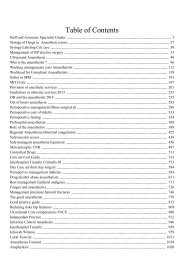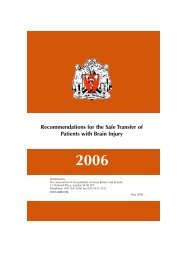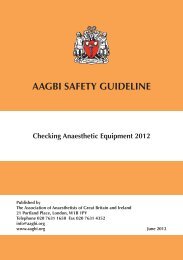TheatrePracticeStandardsGeneric1
You also want an ePaper? Increase the reach of your titles
YUMPU automatically turns print PDFs into web optimized ePapers that Google loves.
Generic Theatre Standard No 06C Management of Patients with<br />
Extended-spectrum beta-lactamases (ESBLs) and Amp C in the<br />
Operating Theatre Department<br />
Standard Statement: All Theatre staff will have knowledge of the requirements for caring for<br />
patients with ESBLs into operating department to protect self, colleagues and patients from the risk<br />
of health care acquired infection.<br />
Extended-spectrum beta-lactamases (ESBLs)<br />
• Bacteria that produce enzymes called extended-spectrum beta-lactamases (ESBLs)<br />
are resistant to many penicillin and cephalosporin antibiotics and often to other types of<br />
antibiotic.<br />
• The 2 main bacteria that produce ESBLs are Escherichia coli (E. coli) and Klebsiella<br />
species. The ESBLs that E. coli most often produce are called CTX-M enzymes.<br />
• E. coli with ESBLs may cause urinary tract infections (UTIs) that can sometimes<br />
progress to more serious infections like blood poisoning, which can be life threatening.<br />
Resistance makes these infections more difficult to treat. (Public Health England, 2014)<br />
General Considerations<br />
RCHT ESBL Policy on precautions to be observed when caring for patients colonised or infected<br />
with extended Spectrum Beta - Lactamase producing organisms<br />
Generic Theatre Standard 04 - Infection control in the Operating Department<br />
Generic Theatre Standard 06 - Management of Patients with MRSA<br />
• Staff risk Transmission of ESBL producing organisms occurs due to poor hand<br />
hygiene and the use of contaminated items in the clinical setting.<br />
• Patient position on list schedule DO NOT NEED to be last on list, however, to<br />
ensure robust cleaning, adequate, non-pressured time be allowed to the staff to clean<br />
effectively.<br />
• Hand Hygiene is of paramount importance and alcohol hand gel is very effective<br />
against ESBLs.<br />
• Personal Protective Equipment (PPE) Disposable Gloves and aprons must be worn<br />
for direct contact with the patient and their surrounding environment and when dealing<br />
with urine and faeces. All staff must change their theatre attire before following<br />
decontamination and cleaning and/or before treating the next patient.<br />
• Environment/equipment cleaning All surfaces cleaned with Actichlor Plus following<br />
surgery. Adequate time for cleaning of the theatre and equipment must be allowed<br />
between patients<br />
• Recovery PACU instructions Known ESBLs patients DO NOT NEED to be recovered<br />
in theatre. Known ESBL patients should not be recovered next to a patient at high risk<br />
of contracting ESBL (for definition, please see the RCHT ESBL Policy). The recovery<br />
bay and all equipment must be cleaned following transfer to the ward. Recovery staff<br />
must ensure that the receiving ward is fully aware of ESBLs status.<br />
• Other All linen must be treated as infected and handled accordingly.<br />
Compliance: 100%<br />
33





